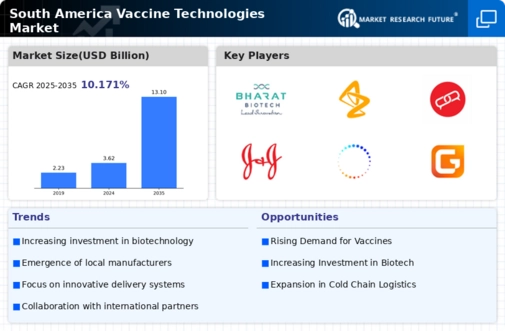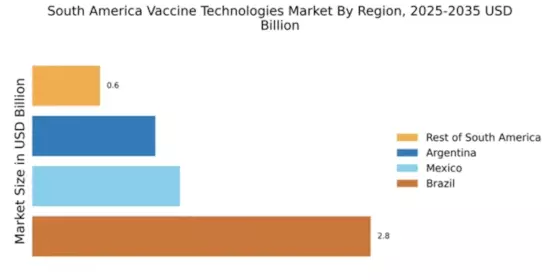Rising Disease Burden
The increasing prevalence of infectious diseases in South America is a critical driver for the vaccine technologies market. Countries in this region face challenges from diseases such as dengue, Zika, and yellow fever, which necessitate the development of effective vaccines. The World Health Organization has reported that the incidence of dengue fever has risen significantly, with millions of cases annually. This growing disease burden compels governments and health organizations to invest in vaccine research and development, thereby stimulating the vaccine technologies market. Furthermore, the economic impact of these diseases on healthcare systems and productivity underscores the urgency for innovative vaccine solutions. As a result, the vaccine technologies market is likely to experience robust growth, with an estimated increase in market value projected to reach $2 billion by 2027.
Regional Collaborations
Regional collaborations among South American countries are emerging as a crucial driver for the vaccine technologies market. Initiatives such as the Union of South American Nations (UNASUR) promote cooperation in health matters, including vaccine development and distribution. These collaborations facilitate knowledge sharing, resource pooling, and joint research efforts, which enhance the overall capacity to address public health challenges. In 2025, it is anticipated that collaborative projects will account for approximately 20% of the total vaccine technologies market in the region. By working together, countries can leverage their strengths and address common health threats more effectively. This collaborative approach not only accelerates vaccine development but also ensures equitable access to vaccines across the region, thereby fostering a more robust vaccine technologies market.
Increased Public Awareness
The heightened public awareness regarding vaccination benefits is a significant driver for the vaccine technologies market in South America. Educational campaigns and community outreach programs have played a vital role in informing the population about the importance of vaccines in preventing diseases. This increased awareness has led to higher vaccination rates, which, in turn, stimulates demand for new vaccine technologies. Surveys indicate that approximately 75% of the population in major South American countries now recognizes the importance of vaccines, compared to 50% five years ago. This shift in public perception is likely to encourage further investment in vaccine research and development, thereby expanding the vaccine technologies market. As more individuals seek vaccination, the market is expected to grow, with an estimated annual growth rate of 12% over the next five years.
Technological Advancements
Technological advancements in vaccine development are significantly influencing the vaccine technologies market in South America. Innovations such as mRNA technology and viral vector platforms are revolutionizing how vaccines are designed and produced. These technologies allow for faster development times and improved efficacy, which are crucial in responding to emerging infectious diseases. In 2025, the market for mRNA vaccines alone is projected to grow by 30%, driven by their success in clinical trials and public acceptance. Additionally, the integration of digital health technologies, such as data analytics and artificial intelligence, is enhancing vaccine distribution and monitoring processes. As these technologies continue to evolve, they are likely to create new opportunities within the vaccine technologies market, fostering a more resilient public health response.
Government Initiatives and Funding
Government initiatives aimed at enhancing public health infrastructure are pivotal in driving the vaccine technologies market in South America. Various governments are allocating substantial budgets to improve vaccination coverage and develop new vaccines. For instance, Brazil's Ministry of Health has launched programs to increase immunization rates, which has led to a surge in demand for vaccine technologies. In 2025, it is estimated that government funding for vaccine development in the region will exceed $500 million, reflecting a commitment to combat infectious diseases. These initiatives not only bolster the vaccine technologies market but also foster collaboration between public health entities and private sector companies, enhancing innovation and accessibility of vaccines across the continent.

















